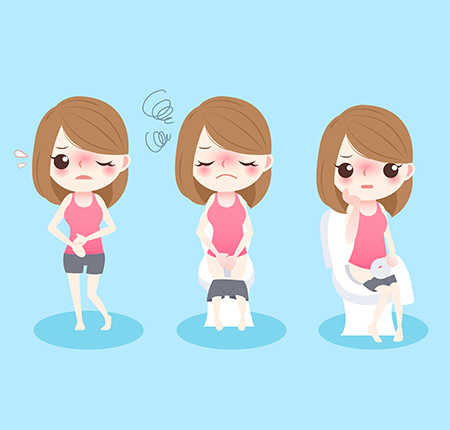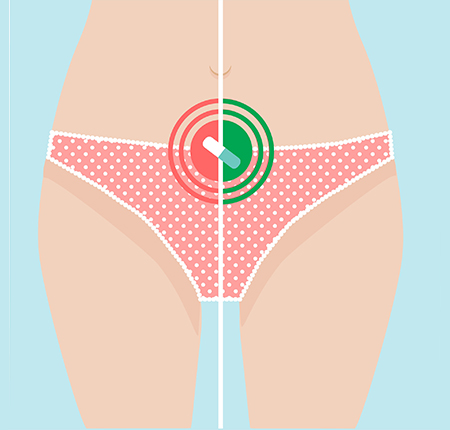
Getting ready to leave the house and it's the 3rd time you've gone to the toilet - sound familiar?
Burning, pain, and a constant need to use the bathroom are all signs that you may have a UTI. Although it doesn't seem like a problem at first glance, frequent urination can disrupt your life and be a warning sign: because urinary problems range from infections and incontinence to pain and frequent urination.
About half of women will have a urinary tract infection at some point in their lives.
Although it is such a common and seemingly harmless condition, urinary tract infection can be confusing and annoying. Sure, there are solutions: over-the-counter medications and alternative treatments, but an infection must be taken seriously because the symptoms and effects of not treating it properly can worsen over time.
What are urinary tract infections?
Urinary tract infections or UTIs (Urinary Tract Infections) occur when Escherichia coli (E.coli) bacteria infect the system that carries urine out of the body - the kidneys, bladder and the tubes that connect them. It occurs more often in women because the female body has a shorter urethra, which favors the multiplication of bacteria, but it also develops in men.
There are 3 types of urinary tract infections
Cystitis - or the most common type of infection - inflammation of the bladder, usually occurs in women
Urethritis - inflammation of the urethra - usually occurs in men
Pyelonephritis - an inflammation of the kidneys, caused by a cystitis that was not treated in time
Why you get a urinary tract infection: causes and risks
Although the causes are bacteria, there are several risk factors that are good to know. It's important to know that a UTI is not a sexually transmitted disease - but sex can promote the migration of bacteria to your urinary tract.
Risks appear, most often, when:
You have a weakened immune system
You use the diaphragm, which can put pressure on the bladder
You ignore some hygiene rules - for example, after urinating, wipe from front to back (to avoid the migration of bacteria to the urethra)
You are wearing synthetic underwear
You use menstrual products that have plastic, fragrance and substances that affect the pH of the vagina and can cause infections
You practice vaginal washes, destroying the bacterial flora that protects you
Your body comes into contact with bacteria from hospitals or public toilets
You have low estrogen, especially in perimenopause or after menopause
You are pregnant - because hormones cause changes and the uterus can press on the bladder
You suffer from kidney stones - in other words, kidney stones - or other conditions such as diabetes
You're constipated - and the bacteria stagnate and can contribute to infections
You have an unbalanced diet and lack vitamins (A, C) and minerals - iron, magnesium, selenium or zinc
What are the symptoms you can recognize?
Depending on the type of infection, the symptoms can be different for lower UTIs (cystitis and urethritis) and upper UTIs (pyelonephritis), but the most common symptoms you can recognize in a urinary infection are the following:

Frequent urination, with the elimination of a small amount of liquid, mostly cloudy
Burning and stinging sensation when urinating
Heaviness in the lower abdomen
Nausea and vomiting
Fever, chills
Back pain - in pyelonephritis
How you can prevent a urinary tract infection
Although the causes, risk factors and symptoms seem complicated, it is simple to prevent an infection: because everything starts with proper hygiene when you go to the bathroom and after you have sex. The basic rule: wipe from front to back, and urinate within 30 minutes after sex.
In addition, it does not allow moisture to persist around the vulva and vagina. Bacteria love moisture. Give up underwear made of synthetic fibers, absorbent pads and conventional tampons made of 90% plastic and synthetic fibers.
Proper hydration (at least 2l of water per day), a balanced diet, a supplement with quality probiotics and last but not least, menstrual products that do not contain toxic ingredients, but which are made of organic cotton or natural fibers can help you prevent a urinary tract infection.
How do you treat a urinary tract infection?

With the appearance of symptoms, a medical consultation and a set of appropriate tests are essential, and your doctor will establish the diagnosis and treatment. Treatment usually includes the administration of antibiotics and probiotics, and herbal teas may be recommended as natural remedies.
With the right treatment, you can treat a urinary infection within a few days of its occurrence, but you must know that there is also the risk of recurrent infections - in short, the feeling that you go through urinary infections endlessly. These can be minimized by long-term low-dose antibiotics or estrogen therapy, depending on what your doctor recommends.
And if we haven't answered all the questions you have about urinary tract infections, write to us! Tell us what you would like to read more about on the blog, and we will gladly answer you!






















